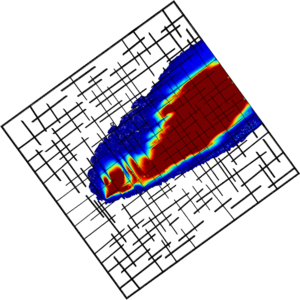Difference between revisions of "Model concepts"
m (→Discrete-fracture model (DFM)) |
m (→Dual-continuum model) |
||
| Line 13: | Line 13: | ||
=== Dual-continuum model === | === Dual-continuum model === | ||
| − | A dual-continuum model uses two or more coupled continua. One | + | A dual-continuum model uses two or more coupled continua. One refers usually to the matrix and the other one to the fracture continuum. Different parameters and equations are used in the continua. They are coupled via exchange fluxes in the source and sink terms. The quantification of these exchange fluxes is usually non-trivial. |
Return to [[Overview]] | Return to [[Overview]] | ||
Revision as of 06:48, 15 June 2016
Contents
Model concepts
For the modeling of flow and transport in fractured porous media, different kinds of model concepts have been developed. Here is an overview of the major groups.
Equivalent porous-medium model (EPM)
An equivalent porous-medium model (EPM) uses usually Darcy's law for the flow calculations. Fractures are not resolved in EPMs and average parameters are used (f.e. mean hydraulic conductivity, mean porosity etc.)
Discrete-fracture model (DFM)
Discrete-fracture models (DFM) discretize the (major) fractures as well as the matrix between them. This is the most advanced modeling approach, but comes with high numerical efforts and data requirements. The fractures have to be characterized by properties like aperture, lenght, spacing, main orientation. Fractures and matrix are usually coupled by flux continuity and continuity of the primary variables (hydraulic head, concentration).
Dual-continuum model
A dual-continuum model uses two or more coupled continua. One refers usually to the matrix and the other one to the fracture continuum. Different parameters and equations are used in the continua. They are coupled via exchange fluxes in the source and sink terms. The quantification of these exchange fluxes is usually non-trivial.
Return to Overview
